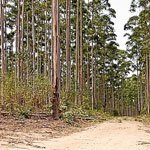
THE two words “Climate Change” have become a catchphrase the world over.
Environment with Musapindira Mlambo
Many conventions have been held, protocols have been ratified and agreements have been signed to tame this problem of climate change, but to no avail.
But the question is why are we still talking about this phenomenon after all these agreements from Cancun (Mexico), Copenhagen (Denmark), and Rio de Janeiro to Johannesburg?
The bottom line is that there is need for less talk and more action on climate change.
It is high time that we do more of action, as far as adaptation and mitigation to climate change is concerned.
Instead of pointing fingers and blaming each other for having more carbon emissions and causing climate change, it is time that we think globally and act locally.
It is important that locally based solutions are crafted to help mitigate climate change.
Forests play vital ecological roles as they act as carbon sinks, thereby trapping the dangerous substances and gases that contribute to climate change.
Studies have shown that the world’s carbon dioxide in the atmosphere as of May 2013 is 399,89 parts per million (ppm) (a measurement for carbon dioxide concentration in the atmosphere). Projections are that they will increase to 600 ppm in the next century. As such, conserving forests will help in reducing the amount of greenhouse gases in the atmosphere, since trees absorb the carbon dioxide.
Deforestation accounts for almost 20% of annual global emissions of carbon dioxide.
Food and Agriculture Organisation (FAO)’s chairperson for Inter-departmental climate change workgroup, Wulf Killmann observed that reducing deforestation would help in mitigating climate change.
“We need to stop deforestation and expand the land area by forests and substitute fossil fuels with bio fuels,” he said recently. The burning of fossil fuels releases carbon dioxide which will then contribute to global warming and climate change.
FAO studies have discovered that forests store more than one trillion of carbon, which is twice the amount floating free in the atmosphere and the destruction of forests will add six billion tonnes of carbon dioxide into the atmosphere each year.
Climate change and forests are intrinsically linked and as a result, climate change experts in the country have been calling for climate change mitigation strategies, such as forest conservation. If these forests are overharvested or burned, they will actually contribute to climate change by becoming sources of greenhouse gases especially carbon dioxide.
It is in light of this that forests should be conserved, so as to help tame the effects of climate change.
Zimbabwe is endowed with vast tracts of forests from Chirinda forest in Chipinge, Chimanimani, and Nyanga to Mapfungautsi in Gokwe. Unfortunately, the rate at which the country is losing these forests mainly due to deforestation for resettlement or domestic purposes and veldt fires is alarming.
The latest Zimbabwe Environment Outlook reports that about 54 % (21million ha) of the country is covered by woodlands and forests. However, figures have shown that woodland hectarage has decreased by 6% due to deforestation from 17 653 to 16 588ha, with bush land decreasing from 5 507 to 4 799ha in the period 1992-2010.
The key drivers to this sorry state has been attributed to agricultural expansion, logging and infrastructural development. The use of indigenous knowledge systems in the conservation of forests is one of the cheapest and effective ways of preserving forests in Zimbabwe.
Indigenous knowledge systems are defined by the World Bank as, the local knowledge that is unique to a given culture or society and it involves taboos, myths or folklore.
Many mountains and forests in the country are believed to be sacred and tampering with them is believed to be resulting in people’s disappearances and disasters.
Traditional leaders must spearhead forest management initiatives
Traditional leaders and elders should be at the forefront of imparting the knowledge to the current generation, since this knowledge is one of the sustainable strategies used worldwide in protecting forests and ultimately curbing climate change.
Combining conventional approaches to forest management and indigenous knowledge systems is the only way Zimbabwe can move forward as a country, since these institutions are vital in forest conservation. A mutual and symbiotic relationship should be fostered between these two elements of the society.
Poverty is another factor that has hindered all efforts and progress towards climate change mitigation and forest conservation in many African countries, because there is a direct dependence on natural resources by rural communities for survival.
Last year, the Meteorological Services Department director, Amos Makarau indicated during the commemorations of World Meteorological Day in Tsholotsho that the southern parts of the country were most affected by climate change.
This year, we commemorated the day on March 21, with the theme centred mainly on forest conservation in order to preserve ecosystems and hence combat climate change.
Reforestation and afforestation projects should be given highest priority, so as to keep our forests intact.
Mahatma Gandhi, the former Indian statesman once decried the plundering of forests and attributed it to human irresponsibility and lack of respect for one another.
“What we are doing to the forests of the world is but a mirror reflection of what we are doing to ourselves and to one another,” he observed.
As such, it is important that forests are conserved, so as to protect our future and that of the next generation from the irreversible effects of climate change.











